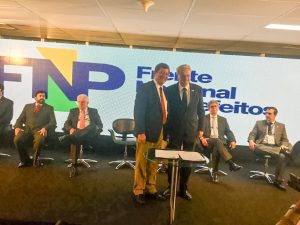The Brazil We Want campaign reaches the municipalities
O National Movement in Defense of the Brazilian Legal Market, coordinated by the Brazilian Institute of Competitive Ethics (ETCO) and the National Forum Against Piracy and Illegality (FNCP), together with more than 70 business entities and civil society organizations affected by illegal smuggling practices, signs a partnership with National Front of Mayors (FNP) with the objective of establishing policies that reduce the trade in illegal products as a result of smuggling, embezzlement and counterfeiting.
To celebrate this union, a cooperation agreement was signed during the IV Meeting of Municipalities with Sustainable Development, in order to encourage the sharing of good practices and initiatives by municipalities to combat illegality.
This action is part of the “O Brasil que Nós Queremos” campaign, launched in March this year, in partnership with the Federal Government. On the occasion, the Minister of Justice, Osmar Serraglio, signed an unprecedented protocol of intentions with the main measures and actions that actually monitor and curb smuggling, encouraging our industries to return to production and trade to sell.
For Edson Vismona, president of ETCO and FNCP and coordinator of the Movement for the Defense of the Brazilian Legal Market, this is an excellent opportunity for the fight to be carried out at the point that most affects Brazilian citizens: the municipalities. “It is essential that we have policies to close the borders, where smuggled products enter the country. But it is in Brazilian cities that this illegal trade occurs, so we also need to establish measures that will allow city halls to combat this problem, ”said Vismona.
MUNICIPAL COLLECTION - In a debate held during the IV Meeting of Municipalities, Vismona presented data from a survey carried out by the FNCP regarding the relationship between the illegal trade in products and the collection of taxes. According to the study, only the transfer of ICMS to Brazilian cities could grow by R $ 4,5 billion annually if these criminal practices were combative in a structured and effective way.
The signed protocol of intentions points out several initiatives that may be adopted by city halls to solve this problem, among them:
- Continuously develop intelligence and repression actions to combat smuggling and embezzlement;
- Increased intensive surveillance to combat the illegal market, with frequent operations to seize products of illicit origin;
- Institution of integrated security offices to coordinate the fight against illegality in the municipalities;
- Promote a policy of closing establishments that sell illegal products, which work without respecting municipal regulations, removing municipal and state registrations;
- Training of municipal guards to combat the illegal market;
Vismona believes that this union of forces is fundamental for the resumption of the dignity of Brazilians. “Illegality has harmful effects not only on the economy and the survival of companies. Much more perverse are the problems it brings to the population, especially for those most vulnerable sections of society that suffer from crime and unemployment ”.
The case of cigarette smuggling is emblematic. According to a survey by the Federal Revenue Service, more than 65% of the smuggled goods entering the country are cigarettes and, in 2016, the volume of illegal cigarettes reached 31,521 billion units and is mostly consumed by classes C and D. “ In addition to financing the trafficking of drugs and weapons, these products do not follow any rules established by the Brazilian health authorities, causing enormous losses to consumers ”, concluded Vismona.




